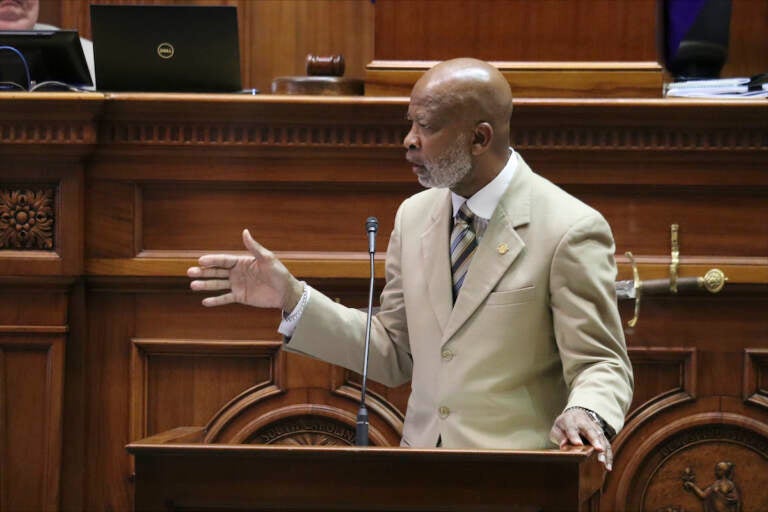Republicans continue push to restrict teachings on race in South Carolina
South Carolina Republicans are one step closer to restricting how race gets taught in K-12 classrooms.

Democratic South Carolina Sen. Ronnie Sabb speaks against a bill restricting how teachers discuss race in K-12 classrooms on Wednesday, May 11, 2023 in Columbia, S.C. The Republican-controlled Senate passed the bill late Wednesday night. (AP Photo/James Pollard)
South Carolina Republicans are one step closer to restricting how teachers discuss race in K-12 classrooms.
As conservatives nationwide push bans on so-called “critical race theory,” the state Senate passed a likeminded effort Wednesday in a late night 27-10 vote after nearly six hours of debate. Parents could challenge any educational materials they say violate banned teachings around white privilege and implicit bias under a bill sent back to the GOP-controlled House.
Missing from the bill is the explicit phrase “ critical race theory.” It instead prevents teaching that an individual “bears responsibility for actions committed in the past” by other members of their race, and that someone is inherently privileged or should receive “adverse or favorable treatment” due to their race.
The bill states that nothing prevents teachings about any ethnic group’s history or the “fact-based discussion” of “controversial” periods and current events. Senate Majority Leader Shane Massey said the bill encourages educators to teach students about slavery and Jim Crow, but within the historical facts.
“ H.3728 keeps the subjective opinions of those who want to rewrite American History from creeping into South Carolina’s schools,” Massey said in a statement.
Democratic Sen. Dick Harpootlian questioned who would determine the “facts.” He worried that parents could challenge lessons that the Civil War was fought over slavery and not states’ rights.
Harpootlian, 74, who is white, added that while he and some Black colleagues all grew up during segregation, they did not share the same experiences, or “facts.”
“When I think back on the 50s and 60s, and my history of growing up in Charlotte, North Carolina, the facts I know are not necessarily the facts you know,” he said.
Opponents said vague language would chill educators’ speech and sanitize the truth. Democratic Sen. Ronnie Sabb asked how teachers should approach the deadly Jan. 6, 2021, U.S. Capitol insurrection if parents who wrongly consider it “an act of patriotism” challenge lessons that call it an attempt to thwart democracy.
Democrats noted the debate came on the same date the state passed a 1740 law making it illegal for enslaved people to assemble in groups, earn money and learn to read.
Sen. Mia McLeod connected the enslavement of Black people to modern-day inequities that opponents fear would be banned from discussion. She pointed to racial disparities in sentencing, generational wealth and health outcomes.
“Instead of prioritizing a solution in search of a problem, I just wonder why we’ve chosen not to focus on the problems that we all know exist systemically,” she said.
The measure would also ban any mandated gender or sexuality trainings and require that materials be “age appropriate.”
Republicans named a couple instances where teachers presented inappropriate or unapproved outside materials. Democrats argued that local school boards already handled those situations by firing the educators in question.
The state’s immediate past Republican education superintendent has said the prohibited concepts are not widespread. Kathy Maness, now the executive director of the Palmetto State Teachers’ Association, told the AP last month that most teachers “won’t have anything to worry about.”
The bill requires school districts to announce on their websites that parents may review curriculum and establish a complaint process for contested materials. Parents could see selected titles online and examine their contents in-person.
Complaints must be lodged by parents and undergo specific steps from the principal to the superintendent to the local school board and finally the state school board.
Republican Sen. Larry Grooms said the process allows parents to know what their children are learning. Opponents argued it amounts to burdensome surveillance that would increase the stressors on a profession already experiencing record vacancies.
Senators struck a provision inserted by the House that would have allowed parents to sue any district they accused of teaching prohibited concepts. Another removed section would have forced teachers to post any changes to classroom materials three days before they were taught.
The bill would cement a budget proviso prohibiting state funds for school districts that “inculcate” a similar list of ideas.
Opponents noted that parents have already cited that proviso in challenges to books like “Stamped: Racism, Antiracism, and You.” A local NAACP branch sued the Pickens County School District last month over its decision to remove the title from its classrooms and libraries.
“We ought not give those who would weaponize legislation like this the power and authority,” Sabb said.

Get daily updates from WHYY News!
WHYY is your source for fact-based, in-depth journalism and information. As a nonprofit organization, we rely on financial support from readers like you. Please give today.




